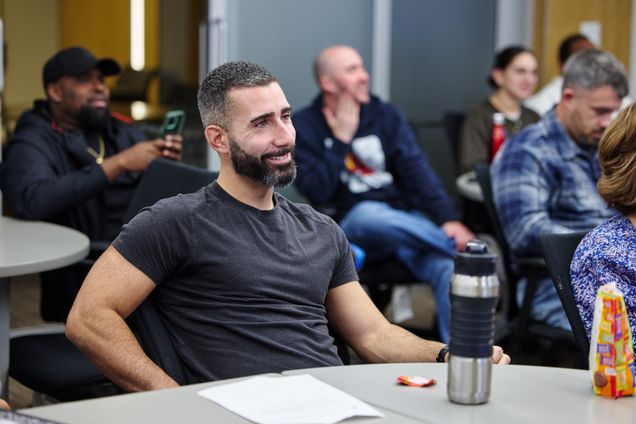CST Spotlight: Chris Highlights Stuttering Journey
Story by CST member Matthew Edwards
The Center for Stuttering Therapy (CST) offers an adult support group on Tuesdays during the fall and spring semesters. The group sessions are facilitated by graduate students in the Department of Speech, Language and Hearing Sciences at Sargent College, under the guidance of CST director Caroline Brinkert, a licensed clinical supervisor who specializes in the treatment of fluency disorders.
Chris initially discovered the CST’s group in 2013. Following his college graduation, he participated in an intensive therapy program at Emerson College and afterward was looking to build on what he learned. With the speech therapist who ran the program at Emerson also running CST groups with former director Diane Constantino, Chris began attending the group in the fall 2013 semester.
“It was an easy introduction and an easy transition into the group therapy setting,” he says.

Chris continued with the group every semester since. Among the most impactful aspects of the group meetings overall for him was being introduced to mindfulness and meditation.
The group offered the first setting for him to practice meditation on a consistent basis. He questioned it at first, not sold on the idea that working on the mental aspect of stuttering would help the physical aspect.
“But as I continued to practice it, I really started to notice the way that I was able to be more aware of the things I was thinking, the things I was feeling, and the way all of those things played into the physical act of stuttering,” Chris says. “Once I had been practicing mindfulness meditation for probably three, four, five years was when I saw a big change and in my ability to change the way that I stutter and a huge improvement in my ability to use the physical fluency enhancing strategies that I learned so many years ago but had struggled to implement in real world settings.”
During the spring 2024 semester, he co-facilitated a group meeting focused on meditation and mindfulness. Naturally, he counts the meeting as one of his favorites of the semester.
He also enjoyed the semester’s group meeting focused on voluntary stuttering and effective communication.
“I am a huge fan of voluntary stuttering,” he says. “I think that was also one of the things that really helped me sort of break free of my stuttering shell and shed away some of the fear associated with stuttering. When I do stutter voluntarily, it helps me to take charge of the situation and take charge of the control that my stutter still sometimes has.”
Chris adds that voluntary stuttering is a good way to desensitize from a tense feeling when stuck in a moment of stuttering, ensuring people who stutter know they will get through it when they do find themselves in a moment of stuttering. He has further found voluntary stuttering to be a fascinating strategy for him to employ because it also makes it easier for him to focus on easy diaphragmatic breathing.
A third meeting he enjoyed — featuring discussions about covert stuttering — reminded him how far he has come in his stuttering journey.

He reflects now, no longer avoiding speaking as he did as a kid and feeling shame, fear or disappointment related to stuttering: “The person I am now, I do not care that I stutter. I realize I do stutter, I always will and I can do the things in life that I want and still stutter.”
Chris also has benefited tremendously from making weekly phone calls with group members. When he started attending group meetings, he felt anxious about needing to speak over the phone and avoided such situations.
“It was through these phone calls that I gained the confidence and the knowledge that the phone isn’t a thing to live in fear of,” he says. “And the more that I made these phone calls, the easier making and receiving phone calls became. It adds up to now — the phone is just a normal thing I do that everybody else does and it just isn’t an issue for me anymore.”
Phone calls with group members not only shifted that mindset, but also helped him develop meaningful relationships with other members.
“It’s a big help when you can form these bonds with the other people in the group. It’s a very good feeling when you can talk to someone that understands and can give you their insight and their opinion and who you can just sort of vent to if you’re having a bad day or week and you just have to talk it through with someone that gets it.”
Recently, he has entered new semesters with excitement and anticipation to listen to new insights from other members and voice his own experiences. But he did not always hold that sentiment.
He initially put pressure on himself and focused solely on improving his fluency, adding that his stuttering was very severe when he first started in the group.
“I had been to four intensive programs and I thought I had tried everything there was to try. It seemed as though every time I opened my mouth I would have these very long blocks and I struggled to get a sentence out.”
Due to his forward-thinking mindset and curiosity, Chris stayed the course.
“Fast forward to now — all of the things I’ve learned over those years, it really shows that this stuff works. If you give it your all, if you listen and really try the things you learn, you will see a huge change not just in the physical way that you stutter and speak, but you will also see a tremendous change in your mental outlook, overall happiness and in the way that you see yourself. You will gain the confidence that you have the ability to do and say all of the things that you want to.”